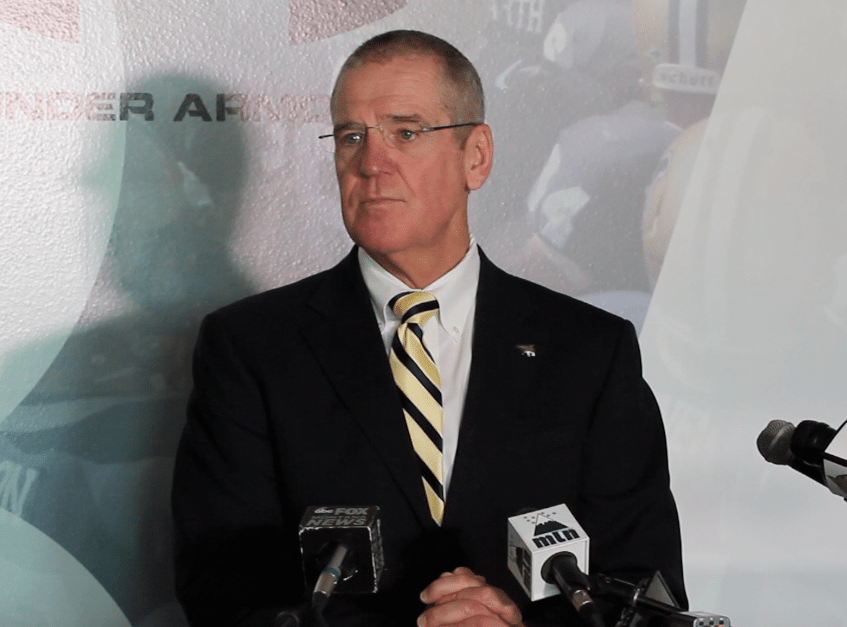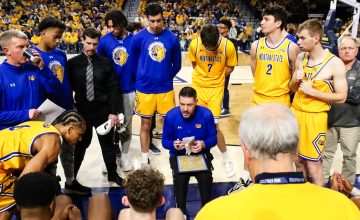Montana State athletic director Peter Fields is one of three finalists for the same position at Northern Iowa, per a report by the Waterloo Cedar Falls Courier on Wednesday.
Fields was on the UNI campus on Monday for an interview for the vacant position. Minnesota State-Mankato AD Kevin Buisman interviewed in Cedar Falls on Tuesday. Iowa State senior associate AD David Harris reportedly interviewed on Wednesday.
Fields has been the athletic director at Montana State since 2002. Earlier this month, MSU president Waded Cruzado announced Fields’ contract would not be renewed upon expiration in June.
“Montana State University will not be renewing the contract of Athletics Director Peter Fields,” Cruzado’s office said in a statement. “Fields will finish out the term of his current contract which runs through June 30, 2016. During that time, he will be carrying out all his duties as AD. MSU thanks Mr. Fields for his many years of service to the university and wishes him well on his future endeavors. The university plans to begin a national search for a successor this spring.”
Fields had an annual salary of $150,660 in 2015. His contract is a year-to-year contract like all Montana State administrators. Fields received a 10 percent raise of roughly $15,000 before signing his most recent contract in June of 2015.
A UNI search committee chaired by Michael Hager, who is also senior vice president for finance and operations, selected the three finalists. UNI is expected to select its new AD by March 1.
Fields’ tenure at Montana State has been filled with success and controversy. Fields helped MSU earn the Big Sky Conference President’s Cup, awarded to the league’s highest achieving athletic department in competition and in the classroom. Fields helped Montana State raise more than $11 million to expand and renovate Bobcat Stadium. He also helped raise funds for the recent renovation of Brick Breeden Fieldhouse.
In the classroom, Fields took over an athletic department and a football program experiencing struggles academically and righted the ship. MSU’s 14 athletic programs have produced 21 consecutive semesters with a grade-point average of better than 3.0. In the spring of 2012 MSU’s cumulative team grade point average topped 3.20, and in the past seven years MSU student-athletes have contributed over 21,000 hours of service in the MSU and Bozeman communities.
The Bobcats won the Big Sky Conference Presidents’ Cups in 2004-2005 and 2011-12. The award is given to the athletic department in the conference that succeeds most thoroughly in competition and in the classroom. Following MSU’s second Presidents’ Cup, Fields was named the NACDA FCS West Region Athletic Director of the Year. He also earned the 2007 General Robert R. Neyland Outstanding Athletic Director Award from the All-America Football Foundation.
In 2006, a brewing storm came to a head when former MSU basketball player Branden Miller and MSU football player John Lebrum were charged and convicted of murdering Jason Wright. The murder was a culmination of building tensions between Wrigth, a cocaine dealer, and a group of MSU athletes including Miller and Lebrum who were using athletic scholarship money to fund a drug ring of their own.
The crime wave led to Mike Kramer’s firing as the head football coach in June. Mick Durham resigned in March after 16 years as MSU’s head men’s basketball coach.
The announcement of Fields’ non-renewal continues a period of change in Montana State athletics. In the spring of 2014, Fields fired Brad Huse after eight seasons as MSU’s men’s basketball coach. Fields hired Brian Fish as his replacement. In November of 2014, Fields fired Kyle Weindel as the women’s volleyball coach. Fields hired J.J. Riley as his replacement.
Following the first losing football season at MSU since 2001, Fields fired Rob Ash after nine years at the helm. Montana State hired Jeff Choate as the 32nd football coach in school history on December 5 of last year.
Fields came to Montana State in the spring of 2002 after spending seven years as an administrator as the University of Missouri. He spent his final four years in Columbus as an associate AD. He previously worked at Toledo (1988-96) and Kent State (1985-1988) in business and budget management.














